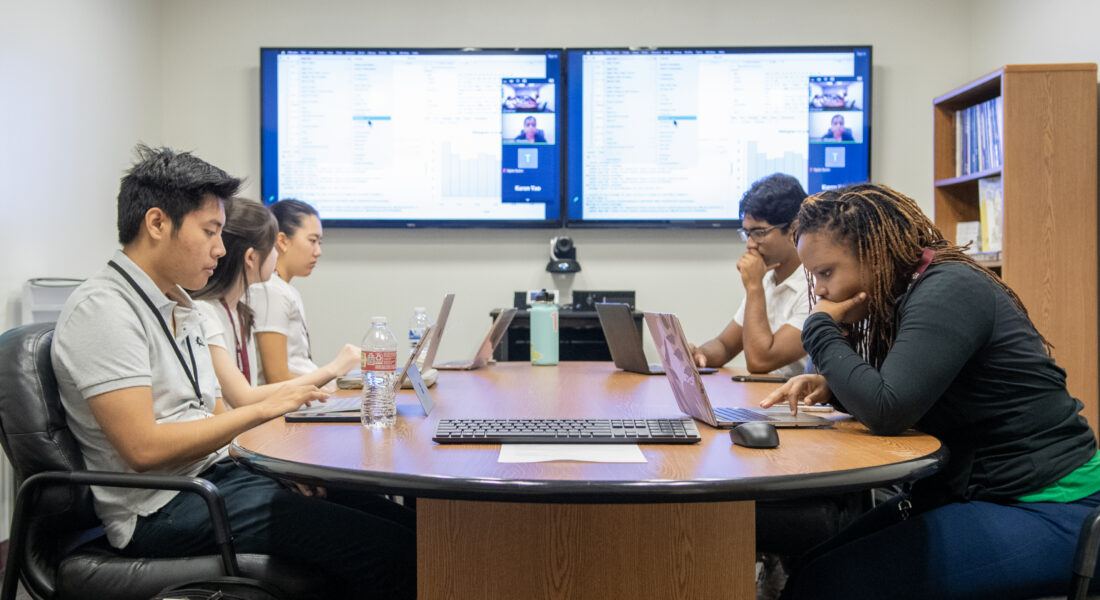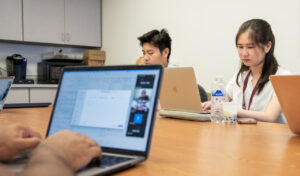New undergraduate research program emphasizes health inequities

Undergraduate students from across the country dove into oral health data this summer in a new research program – Biomedical Informatics and Behavioral Sciences (BIBS) – at Texas A&M School of Dentistry.
Funded by the National Library of Medicine, the program gives students tools to analyze data, connect it to behavioral sciences and utilize their findings to better understand the oral healthcare needs of specific populations, and the reasons for disparities in care. Assistant professor Dr. Peggy Timothé is program director.
“My goal is to ultimately develop students who are not only interested in dentistry as a career, but specifically dental public health,” said Timothé, who also leads the school’s public health residency. “This summer we’ve had a variety of different speakers to talk about dental public health research, careers as an oral health researcher and issues in dental public health such as health inequities and barriers to oral health care.”
Five students – four pre-dental and one pre-med – participated in the inaugural nine-week program. In addition to attending weekly lectures with guest speakers, students took a mini-course in biostatistics taught by faculty at Texas A&M University in College Station and worked on individual research projects with the guidance of a research mentor.
Brandon Dinh, a senior at the University of Texas at San Antonio, said he was drawn to the program to gain research experience.
“I’ve never had a research experience, so this is a first for me,” he said. “You don’t usually hear about research in public health; you hear about regular work in the lab and in clinical stuff, so it’s something different.”
Taylor Butler, a senior at North Carolina Agricultural and Technical State University in Greensboro, applied because she wanted to concentrate on disparities in oral health care.
“With this program being more bioinformatics and research-based, I wanted to see how that could help and better serve underserved communities,” she said.
Timothé explained “bioinformatics” is a relatively new term used to describe the advanced analysis of biostatistics in pre-existing datasets to determine the cause of certain health issues in specific populations. Texas A&M School of Dentistry is one of 15 bioinformatics summer programs funded by the NLM, but it is the only one studying oral health data.

Karen Yao, a senior at the University of Texas in Austin, said before joining the program, she didn’t realize some researchers focus solely on data analysis.
“In the very first week, we talked to a researcher who does work similar to what we’re doing,” she said, “where someone else has already collected the data, and he takes that data and works with it statistically to find new conclusions. I thought people who were really involved in the experimental design and the collection of the data would do the analysis themselves. I didn’t realize there are jobs that specifically deal with the analysis portion of the work.”
Noah Joseph, a senior at Texas A&M University, said the BIBS program has been an educational experience, and he’s gained tools that will help him conduct more research in the future. His project this summer involves analyzing the effects of various demographic and social factors on one’s health outcomes.
“This is in an effort to quantify the effect of each factor and compare that to see which factor influences your health more than others,” he said. “I chose that because I feel like you can apply it to a lot of different fields, and you can use it in your clinical practice.”
Joseph, along with the other BIBS students, will present their research projects Aug. 2 at the Summer Undergraduate Research Poster Session in College Station. The event showcases research, scholarly and creative activity conducted at Texas A&M University by students from institutions worldwide.
“Because we’re a new program, no one really knows what projects our students are working on, but I think their research posters will show the depth of the program and will boost interest,” Timothé said.
Irene Jun, a senior at Claremont McKenna College in California, said coming into the program she was aware of some disparities in care, but now she better understands the depths of those differences.
“I knew there were different components affecting underserved communities and their access to public health, and oral health in particular, but through this program, I’ve learned about how complicated it is,” she said. “There are many factors and layers intertwined.”
This was Timothé’s aim for the program.
“I want these students to leave here knowing how much work it takes to promote oral health for everyone in this country,” she said. “I hope they recognize that we have a lot of unmet need that is typically unseen.”
The BIBS program was funded for five years at $125,000 each year. Applications for the 2024 program will open in January.